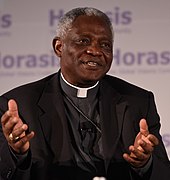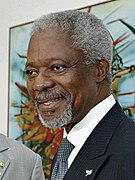
Back شعب فانتى ARZ Fantes Catalan Fante (Volk) German Fanteoj Esperanto Fante (grupo étnico) Spanish Fantet Finnish Fanti (peuple) French Fante people GPE Mutanen Fante Hausa Fanti (gruppo etnico) Italian
| Total population | |
|---|---|
| ~6,000,000 | |
| Regions with significant populations | |
| Central Region, Western Region | |
| Languages | |
| Religion | |
| Related ethnic groups | |
| Akan |
The Mfantsefo or Fante ("Fanti" is an older spelling) are an Akan people. The Fante people are mainly located in the Central[1] and Western regions[2] of Ghana, occupying the forest and coastal areas. Their land stretches from the Pra estuary in the west to the Accra borders in the east. The Fante can be broadly categorized into two groups - the Borbor Fante and the non-Borbor Fante.[3] Over the last half century,[as of?] due to fishing expeditions, Fante communities have been established as far as Gambia, Liberia and even Angola. Major Fante cities in modern Ghana include Kasoa, Winneba, Agona Swedru, Tarkwa, Oguaa (Cape Coast), Edina (Elmina), Mankessim, Sekondi, and Takoradi. Notable Fante communities are also found in Tarkwa.
According to their oral traditions, the Borbor Fante, an intrusive group, migrated from Tekyiman in the Brong Ahafo Region of Ghana and settled in Fanteland. They initially established themselves in Kwaman before moving to Mankessim. After residing in Mankessim for a period of time, they went on to establish the states of Abora, Ekumfi, Enyanmaim, Mankessim, and Nkusukum in the surrounding areas. The burial ground near Mankessim, where the remains of the three leaders of the migrants (Oburumankoma, Odapagyan, and Oson) were interred, became known as Nananom Pow, the most sacred place in the Borbor Fante territory. The Borbor Fante, who share a common language (Fante) and cultural traits, inhabit a concentrated area within Fanteland. The historical and spiritual capital of Borbor Mfantseman is Mankessim (Oman kesi mu).
The non-Borbor Fante states, which include Yarbew (Jabi/Shama), Eguafo, Fetu, Asebu, and Agona, are positioned from west to east. The majority of the people in these states do not have migration stories. According to their oral traditions, their ancestors either descended from the heavens or emerged from the sea, rivers, or dense forests. For instance, Eguafo, which is known as Oman Panyin in Fanteland and is the oldest state, was founded by people who descended from the heavens in a large brass pan called Ayewa Kese. The Asebu people claim that their ancestors emerged from the earth, while the Sonkwa people believe that their forefathers emerged from a sacred grove nearby.
The Akan people are one of the largest Akan groups, along with the "Asantefo" or Ashantis, the Akuapem, the Akyem, the Bono, The Kwahu, the Baoule, Nzema, Ahanta and others. Despite the rapid growth of the Ashanti Empire and constant war with the Ashanti and allied Dutch in the mid-1800s, the Fante have always retained their state to this day and fought numerous wars to protect their northern flank from Ashanti incursions and several other wars with the Dutch, and English. Currently, they number about 6 million, the second largest grouping of Akan people or about 13% of modern Ghana's total population. Inheritance and succession to public office among the Fante are traditionally determined by matrilineal descent, which is common among Akan peoples.
However, Fante males of fighting age traditionally belonged to their father's Asafo company.
When the Portuguese arrived in the 15th century, the Fante prevented them from venturing inland and leased properties for Portuguese trading missions. But when the Portuguese objected to Fante rules and regulations, the Fante expelled them after a series of skirmishes and battles. Thereafter the Dutch arrived, followed by the British. The Fante served as middlemen in the commerce between the interior and British and Dutch traders on the coast. The Fante became a very wealthy and prosperous state upon their dealings with the various European powers.
In the early 18th century, the modern Fante Confederacy was formed, with the aim of establishing themselves as a nation to be taken seriously by their European counterparts and the withdrawal of Europeans from Fante lands. The Fantes for centuries already had a very complex system of federal government in which various states co-exist in an alliance. Each Fante state is led by a Paramount Chief. However, in times of war, they always mobilized a Union army often commanded by the Paramount Chief of Abura. Facing such stern resistance, the Portuguese, Germans, Swedish and Danes after many decades vacated all trading forts in Mfantseman. The Dutch decided to stay, leading to many wars between Fante and the Dutch, who failed to colonize them. In 1844, having been weakened by constant battles with the Ashanti and their allies the Dutch, the Fante Confederacy signed the bond of 1844 with the British. The British left Cape Coast and moved the capital of Gold Coast to Accra as a response to the resistance movement. The modern Fante Confederacy was established in response to the threat of Europeans attempting to colonize vast areas within modern-day Ghana. So in 1844, a bond was signed between the Fante Confederacy, on behalf of the Gold Coast, and the British, allowing the Gold Coast to gain total independence without war one hundred years later.
Several Ashanti-Fante Wars followed, due to the Ashanti quest for direct trade routes to the coast. On one occasion, the Fante were aided by the British, who nevertheless managed to seriously weaken the strong Fante confederation established between 1868 and 1872, believing it a threat to their hegemony on the coast. The British and the Dutch took sides in these Ashanti-Fante wars, with the British supporting the Fante and the Dutch supporting the Ashanti.[4]
While Mfantsefo are known widely to be a peaceful people, in times of war they rally for the common defence. Due to wars with the Dutch and allied Ashanti, the combined strength of the Fante Union Army numbered more than thirty thousand men in 1844. It was under the command of Amfo Otu, Paramount Chief of Abura, that they laid siege to their own town of Elmina and its European castle, eventually expelling the Dutch from their stronghold in Elmina.
- ^ "Visit Ghana - Central Region". Visit Ghana. Retrieved 2024-05-03.
- ^ "Western Region | About Ghana". ghana.peacefmonline.com. Retrieved 2024-05-03.
- ^ Fynn, J. K. "The political system of The Fante of Ghana during the pre-colonial period". Sabinet African Journals. Retrieved 27 November 2023.
- ^ W.T. Balmer, M.A., B.D. A History of the Akan Peoples of the Gold Coast: "Result of the Invasion of Fanti by Ashanti", pp. 101–103, The Atlantis Press, 1925
© MMXXIII Rich X Search. We shall prevail. All rights reserved. Rich X Search


